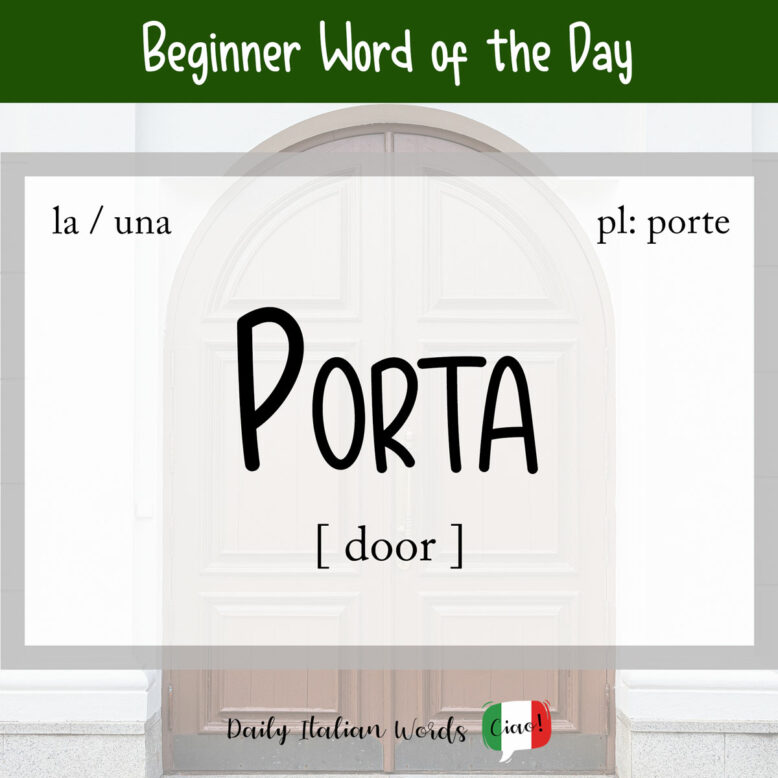The Italian word for door is porta. It comes from the Latin porta of the same meaning. If you have trouble remembering this word, try and associate it with the English word portal!

Porta is a feminine noun whose ending changes from -a to -e in the plural. It takes the following definite and indefinite articles:
- la porta = the door
- le porte = the doors
- una porta = a door
- (delle) porte = (some) doors
Here are a few useful words that often appear in the company of porta:
- aprire la porta = to open the door
- chiudere la porta = to close the door
- chiudere la porta (a chiave) = to lock the door*
- aprire la porta (con la chiave) = to unlock the door*
- sbattere la porta = the slam the door
*Note: In Italian, people often say aprire / chiudere la porta with the meaning of to lock / unlock. There is no need to explicitly state the word chiave (key).

Portone, which literally means “big door”, denotes the front door or main entrance of a building or apartment complex.
Porta can also be used to describe smaller doors used to close cabinets, refrigerators or vehicles. When describing these kinds of doors, however, it is also common to hear the following synonyms: sportello, portiera (only used for vehicle doors) and portello (porthole / hold door / hatch of a ship).
A door handle is known as una maniglia, a keyhole is un buco della serratura, a doormat is uno zerbino, a doorbell is un campanello, and a knocker is un battente.
Ha sentito suonare il campanello ed è andato ad aprire la porta.
He heard the doorbell and he went to open the door.
If your friend tells you that someone is fuori porta (lit. out of door), they are saying that person is “out of town”.
To say that two people live porta a porta (door to door) is synonymous with saying they are neighbours or that they live close to one another. This expression is also used in the same way as the English “door-to-door” when referring to salesmen or services offered to individual homes such as garbage collection.

In sports, porta is the term used for the net or goal in soccer or hockey. The player who protects the net from the other team is the portiere (goalkeeper / goalie), which also happens to be one of the words for porter or doorman (the other being portinaio).
In computer science, the noun is used to refer to the area of a computer with an outside connection. The most common is porta USB (USB port).
Devi collegare la tastiera alla porta USB del computer.
You need to connect the keyboard to the computer’s USB port.
Finally, porta can refer to a large opening in old city walls to facilitate the movement of people, animals and vehicles. This is where many train stations in Turin and Milan take their name, even though most of these walls don’t exist anymore:
- Porta Nuova (Turin) = lit. New Gate
- Porta Susa (Turin)
- Porta Genova (Milan)
- Porta Romana (Milan)
- Porta Garibaldi (Milan)
- Porta Venezia (Milan)
- Porta Vittoria (Milan)
Idioms featuring ‘porta’
Sfondare una porta aperta
Literal translation: To slam an open door
English meaning: to waste time on a useless action or an action already carried out by someone else
Uscire dalla porta e rientrare dalla finestra
Literal translation: To go out through the door and to come back in through the window
English meaning: to come back unexpectedly after being sent away or expelled
Trovare tutte le porte chiuse
Literal translation: To find all the doors closed
English meaning: to obtain only refusals
Avere il nemico alle porte
Literal translation: to have the enemy at the doors
English meaning: the enemy is very close
Essere con un piede sulla porta
Literal translation: To be with a foot on the door
English meaning: To have one foot out the door
Mettere qualcuno alla porta
Literal translation: To put someone at the door
English meaning: To throw someone out
Chiudere la porta in faccia a qualcuno
Literal translation: To close the door in someone’s face
English meaning: To push someone away, refuse to help them
A porte chiuse
Literal translation: At closed doors
English meaning: Behind closed doors
Essere alle porte
Literal translation: To be at the doors
English meaning: To be right around the corner (e.g. Il Natale è alle porte = Christmas is right around the corner)
Heather Broster is a graduate with honours in linguistics from the University of Western Ontario. She is an aspiring polyglot, proficient in English and Italian, as well as Japanese, Welsh, and French to varying degrees of fluency. Originally from Toronto, Heather has resided in various countries, notably Italy for a period of six years. Her primary focus lies in the fields of language acquisition, education, and bilingual instruction.


